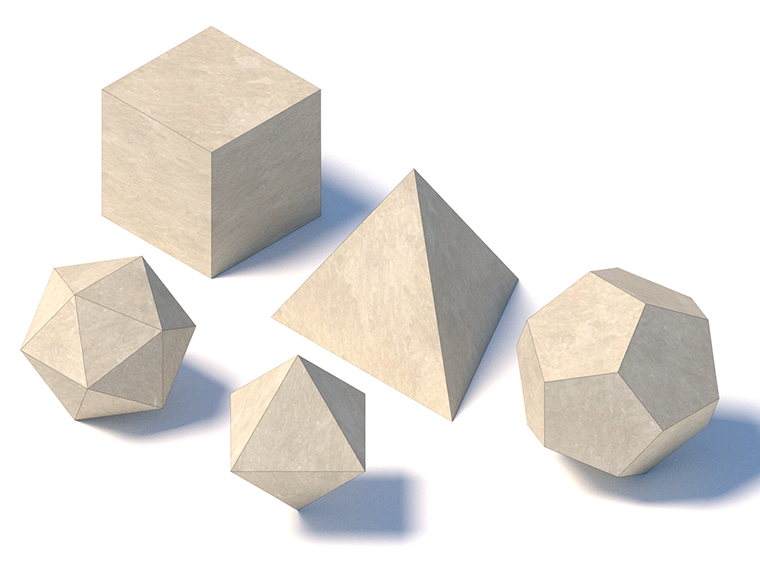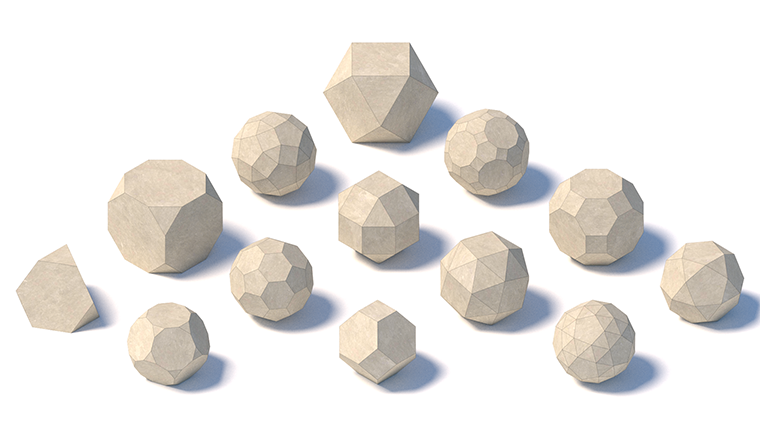algorithmic modeling for Rhino
In my ongoing attempt to collect some basic data for parametric architects to use, I wrote a short outline of basic geometries.
11 CLASSICAL ARCHITECTURAL GEOMETRIES
The type and use of geometry in architecture is a fundamental element of the variation between styles or language of architecture. The type of geometry is often conflated with meaning. One concept is that architectural style-isms like art swing between periods of “romanticism” and “realism”. With “romantic” being soft, using decoration and curvature, and “realism” being stripped down and hard edged. Another concept is that the swing is between the metaphysical/godly and the worldly/functional. Any such simplification is just that, a simplification. And this needs to be kept in mind when reading the following.
THE 5 PLATONIC SOLIDS:
Named for Plato who in the Timaeus dialogues, hypothesized that the classical elements of earth, water air and fire were made of these regular solids.
Platonic solid is a regular, convex polyhedron. It is constructed by matching side, regular, polygonal faces. With the same number of faces meeting at each corner. The five solids are Cube, Tetrahedron, Dodecahedron, Icosahedron, and Octahedron.
THE 13 ARCHEMEDIAN SOLIDS:
Named after Archemedes who discussed them in a now lost work. Unlike the Platonic solids the Archemedian solids are not identical, but convex uniform polyhedra composed of regular polygons meeting in identical vertices. The 13 solids are:
- Truncated Tetrahedron
- Truncated Cube
- Rhombicosidodecahedron (Small Rhombicosidodecahedron)
- Cuboctahedron (Rhombitetratetrahedron)
- Truncated Dodecahedron
- Truncated Icosahedron
- Rhombicuboctahedron (Small Rhombicuboctahedron)
- Truncated Icosidodecahedron (Great Rhombicosidodecahedron)
- Truncated Octahedron (Truncated Tetratetrahedron)
- Snub Cube (Snub Cuboctahedron)
- Truncated Cuboctahedron (Great Rhombicuboctahedron)
- Snub Dodecahedron (Snub Icosidodecahedron)
- Icosidodecahedron
To read further, visit https://www.thorarchitects.com/architecture-geometry/
Views: 1319
Comment
-
Comment by Michael Dubby on October 21, 2023 at 11:09am
-
Classical architectural design stands as a timeless testament to the beauty of symmetry and balance. Its enduring appeal transcends eras, gracing buildings with graceful columns, ornate cornices, and intricate details. The principles of classical architecture, rooted in ancient Greece and Rome, continue to inspire contemporary design. To explore the seamless blend of tradition and modernity, visit https://www.theruggedrooster.com/home-decor/. Discover classical architectural elements that enhance any interior, creating a sense of elegance and refinement that never goes out of style.
-
Comment by MillieJordon on June 19, 2023 at 10:12pm
-
Classical architecture is known for its use of geometric shapes and patterns to create beautiful and harmonious structures. There are 11 classical architectural geometries that are commonly used in traditional building design. These geometries include the circle, square, rectangle, triangle, pentagon, hexagon, octagon, dodecagon, decagon, icosagon, and the ellipse. Each of these shapes has its own unique properties and uses in architecture. I have successfully found BetMGM casino in New Jersey source that is really helpful with finding right casino info when it comes to increase your success rate in betting to get more chance to win big.
© 2026 Created by Scott Davidson.
Powered by
![]()


You need to be a member of Grasshopper to add comments!